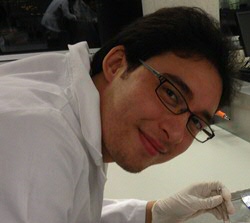YAG PhD-projects 2018

Sean Gryb
The Epistemology of Cosmology
Supervisors: Dr Simon Friedrich (University College Groningen - Philosophy) and Dr. Diederik Roest (FSE - Theoretical Physics)
Can science operate normally when the object of study is the Universe as a whole? Or does the scientific method, conceived and applied in a laboratory setting where observations are made and reproduced in a controlled environment, require special consideration when applied in a cosmological context? A tacit assumption of modern cosmology is to operate scientifically as if it were `business as usual'. While impressive progress has undeniably been made in contemporary cosmology, profound and arguably unprecedented philosophical concerns have been raised by recent investigations.
These worries constitute a troubling list of conceptual and methodological problems ranging from fine-tuning issues to model proliferation. A remarkable fact, which has hitherto gone relatively unnoticed, is that these problems might be seen as sharing a common origin: they seem to arise from difficulties in attributing a notion of probability to the states of the entire Universe. Since conventional modes of scientific confirmation -- such as Bayesian Confirmation Theory -- are fundamentally reliant on notions of probability, the assumption that science can operate normally in this setting urgently requires investigation.
Over the course of this PhD project, we will elucidate the claim that many of the philosophical problems relevant to cosmology can be addressed by rejecting certain intuitions originating from probability-based reasoning in favor of qualitative schemes motivated by the unique epistemological considerations relevant to cosmology. We will then propose, formalize and test concrete proposals based on these considerations.

Lionel Newman
The compassionate robot
Supervisors: Dr. Marieke van Vugt (FSE - Computational Cognitive Neuroscience) and Prof. Ming Cao (FSE- Robotics)
My research focuses on investigating how we make sense of the intentions and beliefs of others in a way that allows us to coordinate our actions. I use a state-of-the-art method from social and cognitive neuroscience called "hyperscanning" to simultaneously measure brain activity from multiple individuals as they interact, with the goal of capturing brain processes responsible for shared information between individuals.
Research in this field has found increased inter-brain synchrony in brain regions associated with theory-of-mind and mirror activity during social cooperation, when compared to independent or competitive behavior, in a wide variety of social contexts. Research suggests that this brain-to-brain coupling can arise via transmission of signals from the motor system of one individual to the perceptual system of the other. As sensorimotor signals interface with the brain, the brain infers information about the state of the world and facilitates appropriate behaviors, which are in turn perceived and processed by the other individual to generate corresponding behaviors.
The goal of my project is to identify neurocognitive processes that modulate the strength of this back-and-forth flow of information between brains, and assess the role they play in social coordination. This research is important because, as the world becomes increasingly interconnected, these findings could provide an intervention for improving social coordination in collaborative team settings. In addition, the final year of the project will involve collaboration with robotics researchers to model the mechanisms responsible for cooperation, working towards social machines that cooperate effectively.
